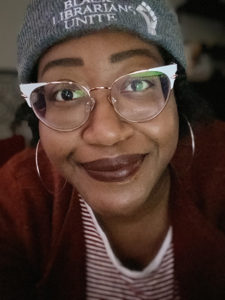An interview with Jasmine Shumaker, September 15, 2020.
Let’s start by having you introduce yourself and tell us what you do professionally.
 My name is Jasmine Shumaker and I am a reference and instruction librarian at University of Maryland, Baltimore County (UMBC). Before coming to UMBC, I was an adult services librarian for the District of Columbia Public Library, working in a small branch. I mainly did senior and adult programming and outreach.
My name is Jasmine Shumaker and I am a reference and instruction librarian at University of Maryland, Baltimore County (UMBC). Before coming to UMBC, I was an adult services librarian for the District of Columbia Public Library, working in a small branch. I mainly did senior and adult programming and outreach.
When did you start your new job?
I interviewed with UMBC in early March shortly before businesses and institutions either closed or shifted to online services only. I was told that I was moving forward in the hiring process (YAY!), but everything would be placed on hold for the time being. So it was a limbo situation where I didn’t know how to give notice to my current place of employment. Ultimately, I started on July 1 and the semester began on August 27.
UMBC decided to go mostly virtual for the fall semester. What does that look like from your vantage point as a new reference and instruction librarian?
UMBC moved quickly in responding to COVID. It’s nice to know that I work for an institution that is taking my health and concerns into consideration. Reference staff will be doing everything online this semester, including chat reference, instructional sessions, and research consultations. Another thing that we’re doing is having a virtual study room that is staffed by student workers in our department. I see this as a way for students to interact with each other outside of their disciplines, because I think that when you’re only interacting with students in your major, you miss out on the college experience.
In general, I enjoy doing outreach to groups who may not be aware of library services and resources. You can use social media tools, you can do creative marketing, but I find it hard coming in as a new person from the public library field when I’m used to heavily relying on face-to-face interactions. It will definitely be an adjustment this semester.
Have you kept tabs on how things are going with your former colleagues who still work at public libraries?
Many of my friends are working at public libraries that are now open to the public. Their libraries are offering basic services, such as limited computer usage and checking out holds, but it does concern me to know that colleagues and patrons could be at risk. Personally, I worked with a number of seniors, and I would hate for them to come to the library to print off a document or pick up a hold, and then have them end up getting sick or getting a colleague sick. It puts me in a weird position. I feel like I left public libraries at a very convenient time for myself and I feel some guilt.
How has it been working with students at this moment in time?
I’ve interacted with our student employees who staff the virtual study room. It has been interesting in finding ways to connect with them, and getting to know how their college experience is going. Students may feel anxiety with going back to or starting school for the first time with what’s happening outside their front door with racial injustice and with COVID. I think our job is to make things easier for them and lighten that load. There’s just so much pressure on students right now to be great and that’s not fair. Who can be great right now?
What advice do you have for institutions that are onboarding new librarians to a virtual workplace?
Now with COVID in the forefront of our minds for the foreseeable future, I would recommend having some sort of onboarding handbook available online. Specifically, something that describes protocols for in-person and remote work and what the differences are, so that new staff wouldn’t have to relearn everything upon returning to campus.
The biggest challenge of being a new employee in an academic library virtually is building relationships and connections in the library and across camps. I was assigned a mentor in my department and she’s great! I would hope that other organizations are also pairing new employees with some sort of mentor or onboarding buddy to help with the process.
How might reference and other library practices change as a result of COVID?
I think COVID will leave a lasting effect on what we do and how we move forward in our roles. The way that we operate is going to change completely: study room procedures, laptop check outs, and the turnaround time for everything is going to change. We have already seen a shift toward online conferences! I know plenty of people have been advocating for more telework opportunities and now there’s no justifiable reason not to allow that—we’ve proven that we can do so much virtually! I think this is a great opportunity to explore how we can be better prepared if there’s ever anything else that happens like this again.
CLIR’s COVID (Re)Collections series explores responses to the COVID-19 pandemic by library, cultural heritage, and information professionals. Stories are proposed by the authors/contributors and reflect their personal experiences and perspectives at the time of submission. Learn more about the series and share your own story here.

